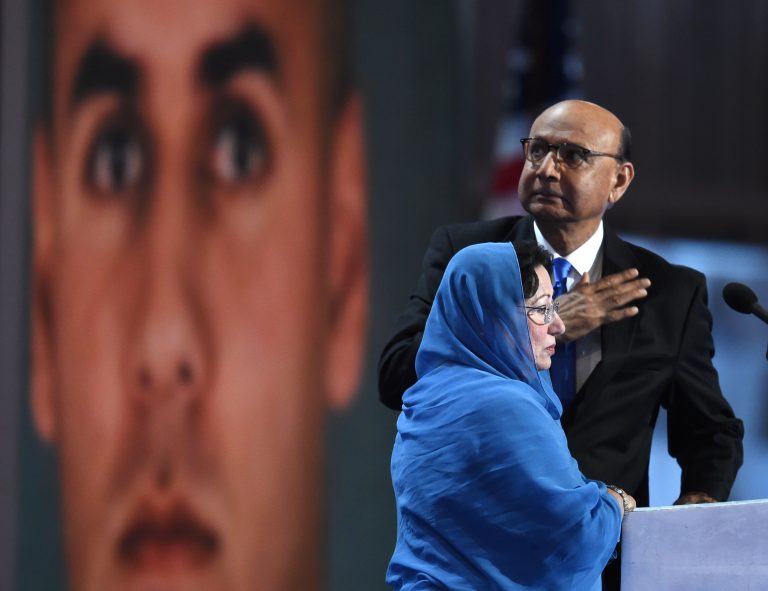
Khizr Khan, father of Humayun S. M. Khan who was killed while serving in Iraq with the US Army, gestures as his wife looks on during the fourth and final day of the Democratic National Convention at the Wells Fargo Center on July 28, 2016 in Philadelphia, Pennsylvania. Image by Timothy A. Clary/Getty Images, © All Rights Reserved.
An Abiding Faith in America
We had a chance to host Khizr Khan and Ghazala Khan at my university, Duke, this past week. Like most of America, I was introduced to this beautiful dignified couple, who had lost their son in the Iraq War, at last year’s Democratic National Convention. In that unforgettable moment, Khizr pulled a copy of the constitution from his pocket, and waved it, asking if then candidate Trump had actually read the document.
We would see Khizr Khan again, in a campaign ad that more directly referenced their enormous, unbearable sacrifice, losing their son, Captain Humayun Khan.
“He saved everyone in his unit. Only one American soldier died. My son was Captain Humayun Khan.”
A tearful Khizr asked Trump: “Would my son have a place in your America?” There was an undeniable poignancy to this grieving father, one who had sacrificed everything and still wanted to belong to America. The ad was so powerful, and for a while it looked like an immigrant, brown, accented Pakistani-American Muslim father may go down in history as the unexpected cultural icon who brought down Donald Trump.
It turns out history has a bigger plan for Khizr and Ghazala Khan.
When we invited them to Duke’s Islamic Studies Center for our annual lecture, I was unsure of what to expect. Would it be a repeat of the DNC convention? Turns out that Khizr and Ghazala have been on the road, almost unceasingly, since that convention. I think Khizr mentioned that they have already given 106 speeches since then.
Most human beings would crumble under the tragedy of losing a child. Or, for a select few, it can take a different turn. Sometimes a heart breaks. And sometimes a heart opens up. Khizr and Ghazala decided to take their heartache, and have it open up their heart. In the words of Hamilton, they have learned to live with the unimaginable.
Yes, this is an immigrant story. It is the story of a couple who moved to the United States, another immigrant comin’ from the bottom. It is a parental story, of parents who have had to live with the pain of losing a son. It is a Muslim story, of a couple whose faith continues to nurture their hearts. It is also a deeply American story. It is one of the most remarkable truths about America, that those who are most marginalized, most systematically and structurally hated upon, get to stand up and be the moral compass of the society. It is African Americans, Jews, Hispanics, Native Americans, and now Muslims who get to remind us of the best that we can be, and must become.
In introducing Khizr, I pointed out how the Khan family’s suffering reminded me of the suffering of Mamie Till, whose 14-year old son Emmett Till was brutally and savagely killed in the South allegedly for having whistled at a white woman. When Mamie held Emmett’s funeral in Roberts Temple Church of God in Christ in Chicago, she insisted on having an open casket funeral so that the whole world could see her suffering. Yet she insisted that she would not give in to hatred, and would dedicate herself to a lifetime struggle to speak out for justice.
I don’t equate these episodes. Mamie came out of a multi-century long experience of slavery, decades of Jim Crow, and a despicable epidemic of lynching all over the American South. But there is something analogous that Khizr and Ghazala Khan, who could be forgiven for sinking into an unbearable pain of losing their son in a war that many see as unjustified, immoral, and illegal, instead began by introducing themselves as a “patriotic, immigrant Americans… who happen to be Muslim.”
One of Khizr’s favorite phrases is “hearten.” He describes what he does as heartening people. We have almost lost this beautiful word from the English language. Ironically, the opposite phrase is with us. The root of “cour” (heart) in words like “encourage,” “discourage” is with us. We speak of being discouraged so often. Dis-heartened. Khizr talks about heartening each other, particularly those who need some encouragement.
He heartens me, this humble, beautiful, grieving man. He speaks of a hole in his heart that will never be filled. His wife, Ghazala, says softly that she does not offer talks in public because she’s afraid that a mere glimpse of her son’s picture might make her break out in tears, violating the dignity of the moment. Yet they continue to have faith in an America yet to come.
Khizr speaks approvingly of the “city on the hill” that Reagan spoke of:
“I’ve spoken of the shining city all my political life, but I don’t know if I ever quite communicated what I saw when I said it. But in my mind it was a tall, proud city built on rocks stronger than oceans, wind-swept, God-blessed, and teeming with people of all kinds living in harmony and peace; a city with free ports that hummed with commerce and creativity. And if there had to be city walls, the walls had doors and the doors were open to anyone with the will and the heart to get here. That’s how I saw it, and see it still.”
I remember Khizr’s voice shaking when he spoke of this “wind-swept, God-blessed” America. He still speaks of a “blessed America.” And when I asked him what makes him look at America as this blessed nation, as this “greatest country in the world” (which he sees America as), with little hesitation he says: the rule of law. He considers constitutional amendments as “dignities,” as blessed and beautiful as lines of scripture.
I confess that these days, all too often, I don’t see America in this light. I no longer see us as the greatest nation on Earth, if I ever did. Nor am I sure that in reality we have equal protection under the law. And I know that Khizr is far too perceptive of a man to not see the ways that we fall short. Rather, he speaks of “the America that I know.” He sees us, the American experiment, not merely as what we are, but as what we might yet become. Like Langston Hughes, Khizr Khan speaks of an America that will be. An America that should be, and has yet to be.
In these days of bombastic nonsense, how lovely to see a beautiful humble human being who hangs on to the power of goodness, the authority of equal treatment under the law, and faith in an America to come.
Mr. Khizr Khan and Mrs. Ghazala Khan, you hearten me.
You hearten America.
You can see the full presentation by Khizr Khan here:

